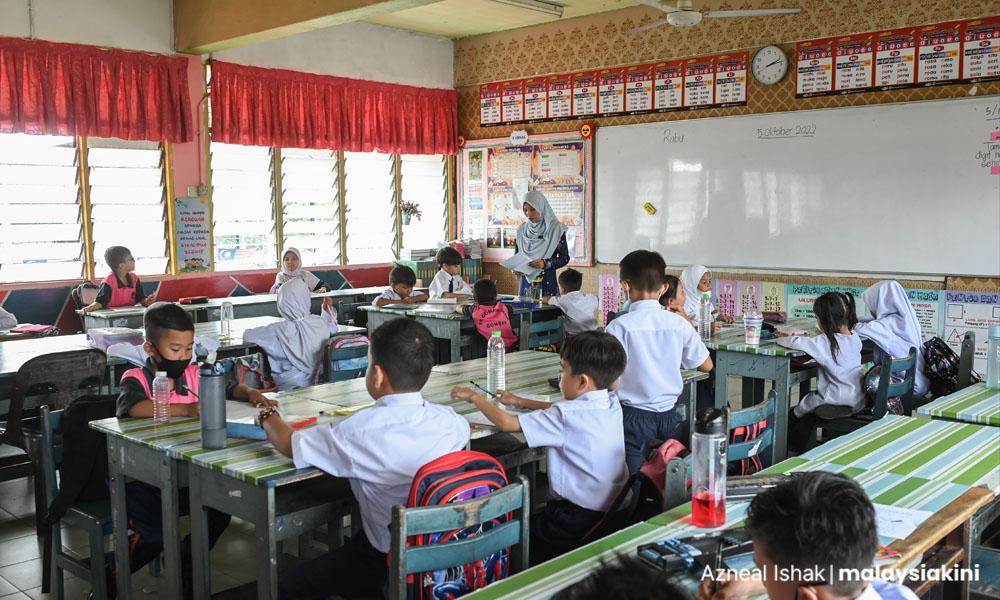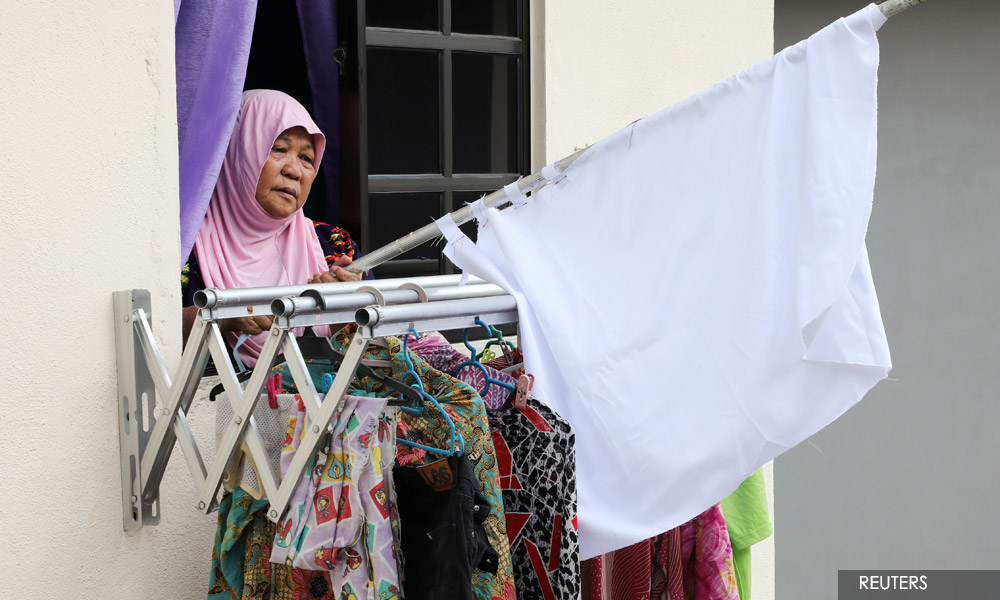Three days ago, a 13-year-old student was punished by a senior teacher for wearing shoes with Velcro straps. She was forced to kneel on the tar road with her hands raised as punishment. The incident took place during the school assembly.
Other students who arrived late to school were conveniently given a more lenient punishment as they were only made to stand behind the girl as she underwent her punishment.
The girl explained to the teacher that her father could not afford a pair of shoes with laces as he did not have the money. Earlier, the girl’s father had already informed the school that he will try his best to replace his daughter’s shoes sometime after Deepavali.
Later, the teacher took the girl to a quiet corner where she cut the girl’s holy string from her right arm and ordered her to remove her “pottu” (black dot) and “vibuthi” (holy ash) from her forehead.
The girl who had just joined the school three weeks earlier used to be the head prefect and a top student in her primary school. She was also a school representative in sports.
Shaken up by the incident, and well aware of the unfair treatment she had received, the girl decided to call her mother and informed her of the incident.
The girl’s parents then contacted the school and spoke to the teacher, wanting to understand the situation better. The teacher, however, claimed everything was fine and refused to continue the conversation.
The parents tried to contact the teacher a second time but failed.
So, they did the next best thing by reaching out to the Education Department. Upon learning about the incident, the officers they spoke to advised them not to lodge a police report. Instead, they advised the parents to “settle” the matter by visiting them at the department the next day.
Hesitant to put such a serious matter on hold, the parents made a police report that same night.

The next morning, the investigating officer arranged for a meeting between both parties at the school. Unfortunately, the teacher dismissed all the allegations. She cited all the meetings she had to attend on the previous day, attempting to prove that the incident never took place.
The teacher suggested that the girl could have cut her own holy string and wiped her own forehead.
The school then tried to convince the parents to withdraw the police report.
Frustrated with the arranged meeting, the parents agreed to withdraw the police report under one condition – that the teacher admits to her wrongdoing and makes a public apology at the school assembly.
The school, however, continued to dismiss all the allegations, forcing the parents to call for stern actions by the Education Ministry and the Education Department.
Setting a good example
I am sharing this detailed occurrence of the incident, hoping that you see how wonderfully strong and brave the girl and her parents are as they fight the unfair and unjust treatment they had suffered.
They did not throw their hands up in the air and blame our broken education system or our failed government for the happenings. Instead, they are actively involved in pursuing justice and correcting the wrong, not only for themselves but also for every other student and parent who may encounter the same problem in the future. Can you imagine the significance of their actions?
Looking at how her parents are not giving in to the school and the Education Department’s pressure to “settle” the matter without a good fight, this girl will surely be inspired to blossom into a young adult who will stand up for herself.
As parents, we not only want to protect our children and ensure their wellbeing, we also have the obligation to teach and mold them into strong characters, ones who would be good and responsible members of our community.
I bet many other parents who are watching this case closely are also inspired to do the same.
This is exactly what I have been trying to convey in my previous piece. We have to learn not to depend on the government for every conceivable needful situation. In places where the system, authorities, and governance are dysfunctional or virtually non-existent, we the people have to learn to be our own champions.
We cannot always feel helpless when confronted with situations out of our control. We must always find a way, or at least try. We must tackle our problems believing we can do it.
People power
People power is the potential of every ordinary citizen to change situations that they believe are unfair. The power comes from our ability to stand together as a group to confront an issue, support each other, and use democratic avenues to influence government policy or public opinion.
Citizen participation has long been regarded as the hallmark of a democratic society. The role we play in assisting the members of our community is an integral element of social change efforts and economic improvement.
Last week, Universiti Kebangsaan Malaysia (UKM) came under fire over its convocation ceremony dress code which prohibited the use of Indian and Chinese traditional attire, the saree and cheongsam. Thanks to our social activists and the people of Malaysia, who took the matter to social media to voice their displeasure, the university has since revised its dress code.
This is people power.
Surely, we could condemn the government for its poor governance, failed systems, and ineffective policies which force us to face similar issues in this multi-race, multi-religion, and multicultural country of ours, over and over again – but where does that leave us if not the exact hole we are in?
While I strongly believe in people power, I do however agree that citizen participation may not be sufficient to solve all our problems. Urging everyone to do their bit is not enough to deliver changes we wish to see.
The government must form policies and systems with the citizens’ interests in mind. And when these policies and systems fail, the government must rectify the situation.
The government has the responsibility of ensuring the creation of an environment where every citizen’s interests and rights are respected, whether by the ruling party and politicians who hold power or by opposition parties and those vying for power.
I agree with all that, wholeheartedly.
But at the same time, we must recognise that actions by our government alone are insufficient. We must also play our part as a member of our society. We must stand up for ourselves, our family, our neighbours, our friends, our colleagues, and our community.
As much as the government has a responsibility toward the people, the people too have a responsibility toward each other.
Hope and faith bring changes
In the same way that the responsibility to protect has driven us to think about how the world responds to racism, poverty, and crimes against humanity, I believe we must also develop a responsibility to those around us.
Take the climate crisis for example. Around the world, global societies are demanding governments and politicians to address the climate crisis. Despite people driving too much, eating too much, consuming too much, and flying too often, governments are forced to step up.
The accepted argument is that we as individuals cannot solve the climate crisis alone. Global challenges must be tackled by the government and institutions and not shifted to the people.
Yet, we see people trying their very best to change their lifestyle to be a little more environmentally friendly. Many of us carry our own grocery bags and water bottles. We purchase eco-friendly and biodegradable products. We eat less meat and more vegetables. We walk more, we cycle, we carpool, and we take more public transportation.
Despite criticising the governments of the world for failing to take significant actions against the climate crisis and despite knowing that personal sacrifice cannot solve the crisis, here we are doing what we can, hoping for change.
Because that is what we humans do. We hope.
We hold our heads high, we stick our chest out, we take a deep breath, and we hope. Knowing we have done the most we could is what builds up our faith and promotes change.
Isn’t that why we, the people of Malaysia, initiated the white flag movement during the recent pandemic while the government and politicians were busy throwing their weight around?

We helped our neighbours and even strangers who were facing extreme hardship under the lockdown while politicians were busy labelling their food baskets with their faces and party logos.
We did not waste our time dwelling over the government’s failure to provide immediate aid to the needy. We did what we could because we can. And this is what successful communities do.
Successful communities are not independent of the government system. However, successful communities share a common vision for the future and play an active role in the development of society with an action-oriented mindset.
Successful communities do not wait around for the government to improve itself, instead, they force the government to play its role while proactively being involved in matters of great importance to the wellbeing of society.
If we want to become a successful community, we should not only be talking about what’s going wrong in our country and who to blame – we should also spend some time playing a significant role in improving the lives of others.
Now if that sounds like horse manure to you, then perhaps you are part of the problem.
“My humanity is bound up in yours, for we can only be human together.”
-Desmond Tutu
-Mkini
FA ABDUL is a multi-award-winning playwright and director in the local performing arts scene, a published author, television scriptwriter, media trainer, and mother. Her ultimate mission in life is to live out of a small suitcase.
The views expressed here are those of the author/contributor and do not necessarily represent the views of MMKtT.



No comments:
Post a Comment
Note: Only a member of this blog may post a comment.